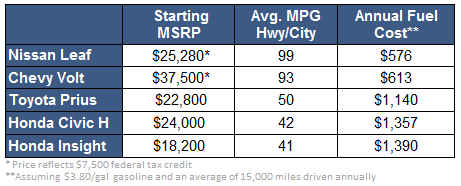Gas prices are near historic highs, and with a national average between $3.50 and $4.00 per gallon, you may be wondering if it's time to buy a hybrid or fuel-efficient car. You're not the only one thinking about it -- small car sales have jumped over 22% YTD compared to this time last year.
But have you ever noticed how high the sticker price of a hybrid can be compared to cars of the same model or class? Is it worth it to pay the higher price on a car to save on fuel costs over the next few years? will you save money overall on the investment and come out ahead in the long run?
InvestingAnswers has crunched the numbers to compare 17 of the most popular fuel-efficient cars based on their manufacturer's suggested retail price (MSRP), MPG (miles per gallon), annual fuel cost, payback period and total cost over five years to find out which car will save you the most green to 'go green.'
We've categorized our comparisons into three categories to make it easier for you to make an informed purchase decision. In the table below, we compare the most popular statistic in fuel efficiency for car buyers and enthusiasts: highest MPG and lowest annual fuel cost.
Top 5 Fuel-Efficient Cars with Highest MPG and Lowest Annual Fuel Cost

The Nissan (NSANY.PK) Leaf and the Chevy (NYSE: GM) Volt top out the list with an impressive EPA estimated 99 MPG and 93 MPG (gas equivalent reading). Their electric and plug-in hybrid engines sip nearly half the fuel of even a hybrid Toyota (NYSE: TM) Prius.
These stats certainly generate plenty of excitement in consumers and media alike. But even with generous federal tax credits of $7,500 each, the Leaf and the Volt's steep price tags dwarf the cost of the same-class Toyota Camry, which starts at a modest $20,190.
The new technology used in hybrids, all-electric and plug-in-hybrid cars impress at the pump, but their initial price may be a bit high for many unless they can prove to save money in the long run.
But suppose that you do decide to pay the premium price on a hybrid or electric vehicle (EV) rather than settle for a conventional gas model of the car. You would probably like to know how long it would be until you made your money back on your extra investment through fuel savings. So we've figured that for you as well in our next comparison category (our table shown below).
Top 5 Hybrids/EV Cars with Fastest Break-Even Time

Top 5 Fuel-Efficient Cars with Lowest Long Term Cost




